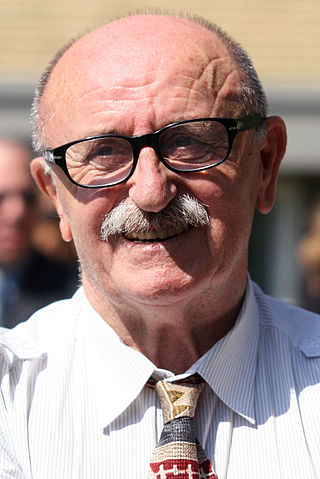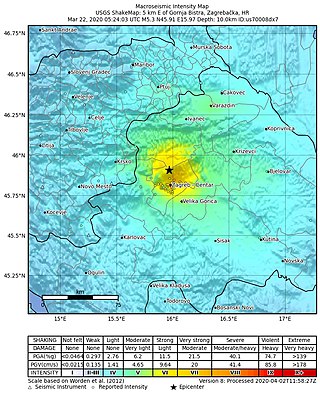Related Research Articles

The demographic characteristics of the population of Croatia are known through censuses, normally conducted in ten-year intervals and analysed by various statistical bureaus since the 1850s. The Croatian Bureau of Statistics has performed this task since the 1990s. The latest census in Croatia was performed in autumn of 2021. According to final results published on 22 September 2022 the permanent population of Croatia at the 2021 census had reached 3.87 million. The population density is 68.7 inhabitants per square kilometre, and the overall life expectancy in Croatia at birth was 78,2 years in 2018. The population rose steadily from 2.1 million in 1857 until 1991, when it peaked at 4.7 million. Since 1991, Croatia's death rate has continuously exceeded its birth rate; the natural growth rate of the population is negative. Croatia is in the fourth stage of the demographic transition. In terms of age structure, the population is dominated by the 15 to 64 year‑old segment. The median age of the population is 43.4, and the gender ratio of the total population is 0.93 males per 1 female.
Latin honors are a system of Latin phrases used in some colleges and universities to indicate the level of distinction with which an academic degree has been earned. The system is primarily used in the United States. It is also used in some Southeastern Asian countries with European colonial history, such as Indonesia and the Philippines, and African countries such as Zambia and South Africa, although sometimes translations of these phrases are used instead of the Latin originals. The honors distinction should not be confused with the honors degrees offered in some countries, or with honorary degrees.
Branimir "Johnny" Štulić is a Yugoslav singer-songwriter, musician and author, best known for being the frontman of the popular Yugoslav rock group Azra. He is known for his charismatic stage performances and inspiring song lyrics that often combined rock poetry with a strong sense for social commentary, which is the cause for him becoming a cult figure.

The Bunjevac dialect, also known as Bunjevac speech, is a Neo-Shtokavian Younger Ikavian dialect of the Serbo-Croatian pluricentric language, preserved among members of the Bunjevac community mostly in the Bačka area of northern Serbia and southern Hungary, particularly in Baja and surroundings. It is also found in Croatia, and in Bosnia-Herzegovina. They presumably originate from western Herzegovina. Their accent is purely Ikavian, with /i/ for the Common Slavic vowels yat.
Grade inflation is the general awarding of higher grades for the same quality of work over time, which devalues grades. However, higher average grades in themselves do not prove grade inflation. For this to be grade inflation, it is necessary to demonstrate that the quality of work does not deserve the high grade.
Academic grading in Canada varies by province, level of education, by institution, and faculty. The following are commonly used conversions from percentage grades to letter grades.
Education in Croatia is a right defended by Article 66 of the constitution which states that everyone is entitled to free compulsory education under equal conditions and in accordance with their aptitudes. Education is mandatory for children aged 10 to 14.
Serbia inherited the academic grading system of the Socialist Federal Republic of Yugoslavia. The grading process uses an absolute achievement scale to determine the grade of a student.
This article is about the grades that are used in Sweden.
In the United States, academic grading commonly takes on the form of five, six or seven letter grades. Traditionally, the grades are A+, A, A−, B+, B, B−, C+, C, C−, D+, D, D− and F, with A+ being the highest and F being lowest. In some cases, grades can also be numerical. Numeric-to-letter-grade conversions generally vary from system to system and between disciplines and status.

Ivo Josipović is a Croatian academic, jurist, composer, and politician who served as President of Croatia from 2010 to 2015.

Robert Jozinović is an Australian film and television actor.

Ivan Vekić was a Croatian politician and lawyer. He was one of the founders of the Croatian Democratic Union and served as the Croatian Minister of Interior during the Croatian War of Independence.
Opinion polling for the 2015 Croatian parliamentary election started immediately after the 2011 general election. Monthly party ratings are conducted by Ipsos Puls, Mediana and Promocija Plus.
Đuka Galović was a Croatian folk musician and songwriter.
This is a list of grading systems used by countries of the world, primarily within the fields of secondary education and university education, organized by continent with links to specifics in numerous entries.

At approximately 6:24 AM CET on the morning of 22 March 2020, an earthquake of magnitude 5.3 Mw, 5.5 ML, hit Zagreb, Croatia, with an epicenter 7 kilometres (4.3 mi) north of the city centre. The maximum felt intensity was VII–VIII on the Medvedev–Sponheuer–Karnik scale. The earthquake was followed by numerous aftershocks, the strongest of which with a magnitude of 5.0. It was the strongest earthquake in Zagreb since the 1880 earthquake and caused substantial damage in the historical city center. More than 1,900 buildings were reported to have been damaged to the point of becoming uninhabitable. The earthquake was also felt in Slovenia. One person was killed and 27 others were injured.
The May consultations were an underground gathering of the Central Committee (Politburo) of the Communist Party of Yugoslavia (CPY) and leaders of its regional branches held after World War II in Yugoslavia started, on the initiative of Josip Broz Tito in early May 1941 in Zagreb, at the time part of the so-called Independent State of Croatia.

On 3 May 2023, a school shooting occurred at Vladislav Ribnikar Model Elementary School in the Vračar municipality of Belgrade, Serbia. The shooter, identified as a 13-year-old Kosta Kecmanović, opened fire on students and staff, resulting in the deaths of ten individuals, including nine students and a security guard. Six others, five students and a teacher, also sustained injuries.
References
- ↑ Kustura, Irena (17 September 2009). "Inflacija petica: U osnovnim školama odlikaša je više od 50 posto". Večernji list (in Croatian). Retrieved 2024-11-15.
- ↑ Vištica, Sanja (11 September 2024). "Superodlikaši postali problem, stvaraju pritisak na srednje škole: "Profesori su popuštali učenicima koji su to pričali..."". Dnevnik.hr (in Croatian). Retrieved 2024-11-15.
- ↑ Plantak, Katarina (2024-03-01). "Nacionalni ispiti za četvrtaše i osmaše su na vratima, istražili smo sve o njima". Net.hr (in Croatian). Retrieved 2024-11-15.